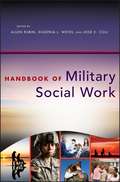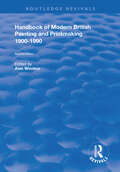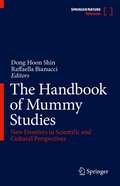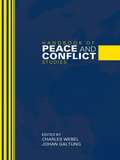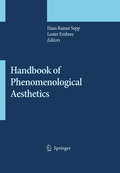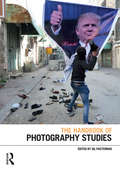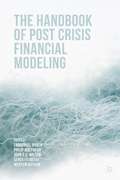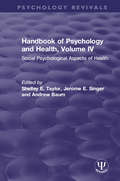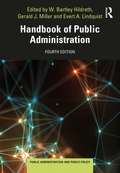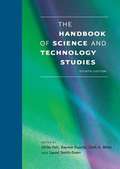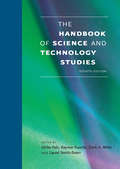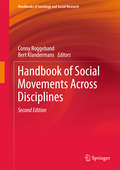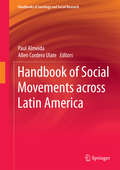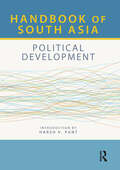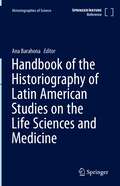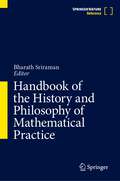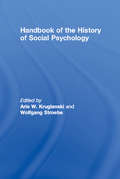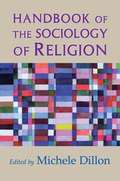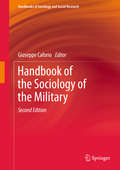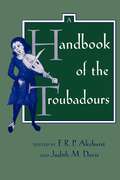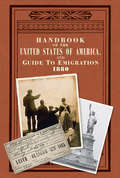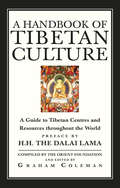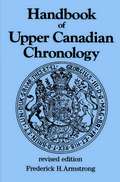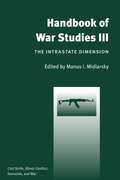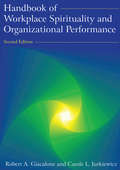- Table View
- List View
Handbook of Military Social Work
by Allen Rubin Jose E. Coll Eugenia L. Weiss<p>The need has never been more crucial for community health providers, programs, and organizations to have access to training in addressing the unique behavioral health challenges facing our veterans, active duty military, and their families. <p>Handbook of Military Social Work is edited by renowned leaders in the field, with contributions from social work professionals drawing from their wealth of experience working with veterans, active duty military, and their families.</p>
Handbook of Modern British Painting and Printmaking 1900-90 (Routledge Revivals)
by Alan WindsorOriginally published in 1998, The Handbook of Modern British Painting and Printmaking 1900-1990 has been designed for people who enjoy, study and buy British art. The only portable dictionary-style guide to the life and work of modern British painters and printmakers, the book provides information on some 2,000 artists, as well as entries on schools of art, on museums, galleries and collections, on societies and groups, and critics and patrons who have influenced the development of modern art in Britain. Compiled by scholars, the entries are cross-referenced and each concise biographical outline provides the relevant facts about the artist's life, a brief characterisation of the artist's work, and major bibliographic references. Wherever possible, one or two suggestions for further reading are cited.
The Handbook of Mummy Studies: New Frontiers in Scientific and Cultural Perspectives
by Dong Hoon Shin Raffaella BianucciOwing to their unique state of preservation, mummies provide us with significant historical and scientific knowledge of humankind’s past. This handbook, written by prominent international experts in mummy studies, offers readers a comprehensive guide to new understandings of the field’s most recent trends and developments. It provides invaluable information on the health states and pathologies of historic populations and civilizations, as well as their socio-cultural and religious characteristics. Addressing the developments in mummy studies that have taken place over the past two decades – which have been neglected for as long a time – the authors excavate the ground-breaking research that has transformed scientific and cultural knowledge of our ancient predecessors. The handbook investigates the many new biotechnological tools that are routinely applied in mummy studies, ranging from morphological inspection and endoscopy to minimally invasive radiological techniques that are used to assess states of preservation. It also looks at the paleoparasitological and pathological approaches that have been employed to reconstruct the lifestyles and pathologic conditions of ancient populations, and considers the techniques that have been applied to enhance biomedical knowledge, such as craniofacial reconstruction, chemical analysis, stable isotope analysis and ancient DNA analysis. This interdisciplinary handbook will appeal to academics in historical, anthropological, archaeological and biological sciences, and will serve as an indispensable companion to researchers and students interested in worldwide mummy studies.
Handbook of Peace and Conflict Studies (Weber in Translation)
by Johan Galtung Charles WebelThis major new Handbook provides a cutting-edge and transdisciplinary overview of the main issues, debates, state-of-the-art methods, and key concepts in peace and conflict studies today. The fields of peace and conflict studies have grown exponentially since being initiated by Professor Johan Galtung half a century ago. They have forged a transdisciplinary and professional identity distinct from security studies, political science, and international relations. The volume is divided into four sections: understanding and transforming conflict creating peace supporting peace peace across the disciplines. Each section features new essays by distinguished international scholars and professionals working in peace studies and conflict resolution and transformation. Drawing from a wide range of theoretical, methodological, and political positions, the editors and contributors offer topical and enduring approaches to peace and conflict studies. The Handbook of Peace and Conflict Studies will be essential reading for students of peace studies, conflict studies and conflict resolution. It will also be of interest and use to practitioners in conflict resolution and NGOs, as well as policy makers and diplomats.
Handbook of Phenomenological Aesthetics
by Lester Embree Hans Rainer SeppThe potentiality of phenomenological aesthetics is enormous, many figures have contributed to it during a time span of over a century, but this is the first work thoroughly to show its breadth, depth, and continuing fecundity. Moritz Geiger, Roman Ingarden, Fritz Kaufmann, Jean-Paul Sartre, Maurice Merleau-Ponty, and Mikel Dufrenne are the central figures and receive substantial treatment. A score of other influential individuals, including Antonio Banfi, Simone de Beauvoir, Oskar Becker, Jacques Derrida, Hans-Georg Gadamer, Martin Heidegger, Michel Henry, Dietrich von Hildebrand, Maurice Natanson, Nishida Kitaro, Jose Ortega y Gasset, Jan Patocka, Paul Ricoeur, Heinrich Rombach, Max Scheler, Alfred Schutz, Gustav Spet, and France Veber also have entries devoted to them. In addition, there are over two dozen entries on such topics such as dream, empathy, enjoyment, imagination, sensation, on style, ecology, gender, and interculturality, and then on areas including architecture, film, and theater. The introduction includes an extensive sketch of the history of phenomenological investigation in this sub-discipline of philosophy. All entries are written by the best relevant specialists, all the entries have bibliographies, and a selected bibliography for the whole is appended. This handbook will be the foundation for many more decades of investigation.
The Handbook of Photography Studies
by Gil PasternakThe Handbook of Photography Studies is a state-of-the-art overview of the field of photography studies, examining its thematic interests, dynamic research methodologies and multiple scholarly directions. It is a source of well-informed, analytical and reflective discussions of all the main subjects that photography scholars have been concerned with as well as a rigorous study of the field’s persistent expansion at a time when digital technology regularly boosts our exposure to new and historical photographs alike. Split into five core parts, the Handbook analyzes the field’s histories, theories and research strategies; discusses photography in academic disciplinary and interdisciplinary contexts; draws out the main concerns of photographic scholarship; interrogates photography’s cultural and geopolitical influences; and examines photography’s multiple uses and continued changing faces. Each part begins with an introductory text, giving historical contextualization and scholarly orientation. Featuring the work of international experts, and offering diverse examples, insights and discussions of the field’s rich historiography, the Handbook provides critical guidance to the most recent research in photography studies. This pioneering and comprehensive volume presents a systematic synopsis of the subject that will be an invaluable resource for photography researchers and students from all disciplinary backgrounds in the arts, humanities and social sciences.
The Handbook of Post Crisis Financial Modeling
by Emmanuel Haven Philip Molyneux John O.S. Wilson Sergei Fedotov Meryem DuygunThe Handbook of Post Crisis Financial Modeling by Emmanuel Haven,Philip Molyneux,John O.S. Wilson,Sergei Fedotov,Meryem Duygun.
Handbook of Psychology and Health, Volume IV: Social Psychological Aspects of Health (Psychology Revivals)
by Andrew Baum; Shelley E. Taylor; Jerome E. SingerOriginally published in 1984, the study of psychological aspects of health was a rapidly expanding enterprise. Most of the contributors to this volume were trained as social psychologists or by social psychologists. Some have been more applied in their focus or on the edge of several fields. All, however, share a common approach, focusing on the individual as he or she is buffeted about by social forces and copes with these forces. All consider situational and psychological factors in the determination of behavior, emotion, or cognition and all apply their expertise to the study of health-related issues. The grouping of the chapters in this volume by the authors’ subspecialty, social psychology, is a somewhat unconventional method of clustering. Ordinarily, the materials presented here would be published in journals or texts concerned with behavior or psychosocial in health and medicine, or in specialty publications dealing with a particular disease or health issue. That clustering of articles is functional in providing information to those most likely to utilize it, but it diffuses the origin and background of the studies. These chapters speak to the diversity of health issues that are amenable to successful social psychological analysis.
Handbook of Public Administration: Theory, Politics, And Methods (Public Administration and Public Policy #1)
by W. Bartley Hildreth Gerald J. Miller Evert A. LindquistPublic administration as a field of study finds itself in the middle of a fluid environment. The very reach and complexity of public administration has been easy to take for granted, easy to attack, and difficult to explain, particularly in the soundbite and Twitter-snipe media environment. Not only has the context for the discipline changed, but the institutions of public administration have adapted and innovated to deliver services to the public and serve those in power while becoming increasingly complex themselves. Has public administration evolved? And what new lines of research are critical for effective policy and delivery of programs and public services while preserving foundational principles such as the rule of law and expert institutions? This Handbook of Public Administration sheds light for new researchers, doctoral students, scholars, and practitioners interested in probing modern public administration’s role in solving major challenges facing nations and the world. This fourth edition recognizes that the scholarship of public administration must reflect the diverse influence of an international orientation, embracing public administration issues and practices in governance systems around the world, and illustrating just how practice can vary across jurisdictions. Every section identifies foundational principles and issues, shows variation in practice across selected jurisdictions, and identifies promising avenues for research. Each chapter revisits enduring themes and tensions, showing how they persist, along with new challenges and opportunities presented by digital technology and contemporary political realities. The Handbook of Public Administration, Fourth Edition provides a compelling introduction to and depiction of the contemporary realities of public administration, and it will inspire new avenues of inquiry for the next generation of public administration researchers.
The Handbook of Science and Technology Studies
by Clark A. Miller Laurel Smith-Doerr Rayvon Fouché Ulrike FeltScience and Technology Studies (STS) is a flourishing interdisciplinary field that examines the transformative power of science and technology to arrange and rearrange contemporary societies. The Handbook of Science and Technology Studies provides a comprehensive and authoritative overview of the field, reviewing current research and major theoretical and methodological approaches in a way that is accessible to both new and established scholars from a range of disciplines. This new edition, sponsored by the Society for Social Studies of Science, is the fourth in a series of volumes that have defined the field of STS. It features 36 chapters, each written for the fourth edition, that capture the state of the art in a rich and rapidly growing field. One especially notable development is the increasing integration of feminist, gender, and postcolonial studies into the body of STS knowledge. The book covers methods and participatory practices in STS research; mechanisms by which knowledge, people, and societies are coproduced; the design, construction, and use of material devices and infrastructures; the organization and governance of science; and STS and societal challenges including aging, agriculture, security, disasters, environmental justice, and climate change.
The Handbook of Science and Technology Studies, fourth edition (The\mit Press Ser.)
by Ulrike Felt Rayvon Fouché Clark Miller Laurel Smith-DoerrThe fourth edition of an authoritative overview, with all new chapters that capture the state of the art in a rapidly growing field.Science and Technology Studies (STS) is a flourishing interdisciplinary field that examines the transformative power of science and technology to arrange and rearrange contemporary societies. The Handbook of Science and Technology Studies provides a comprehensive and authoritative overview of the field, reviewing current research and major theoretical and methodological approaches in a way that is accessible to both new and established scholars from a range of disciplines. This new edition, sponsored by the Society for Social Studies of Science, is the fourth in a series of volumes that have defined the field of STS. It features 36 chapters, each written for the fourth edition, that capture the state of the art in a rich and rapidly growing field. One especially notable development is the increasing integration of feminist, gender, and postcolonial studies into the body of STS knowledge. The book covers methods and participatory practices in STS research; mechanisms by which knowledge, people, and societies are coproduced; the design, construction, and use of material devices and infrastructures; the organization and governance of science; and STS and societal challenges including aging, agriculture, security, disasters, environmental justice, and climate change.
Handbook of Social Movements Across Disciplines
by Conny Roggeband Bert KlandermansThis book aims to revisit the interdisciplinary roots of social movement studies. Each discipline raises its own questions and approaches the subject from a different angle or perspective. The chapters of this handbook are written by internationally renowned scholars representing the various disciplines involved. They each review the approach their sector has developed and discuss their disciplines' contributions and insights to the knowledge of social movements. Furthermore, each chapter addresses the "unanswered questions" and discusses the overlaps with other fields as well as reviewing the interdisciplinary advances so far.
Handbook of Social Movements across Latin America
by Paul Almeida Allen Cordero UlateThis handbook covers social movement activities in Latin American countries that have had profound consequences on the political culture of the region. It examines the developments of the past twenty years, such as a renewed upswing in popular mobilization, the ending of violent conflicts and military governments, new struggles and a relatively more democratic climate. It shows that, from southern Chiapas to Argentina, social movements in the 1990s and especially in the 2000s, have reached new heights of popular participation. There is a lack of research on the politics of this region in the contemporary era of globalization, this volume partially fills the void and offers a rich resource to students, scholars and the general public in terms of understanding the politics of mass mobilization in the early twenty-first century. The contributors each address social movement activity in their own nation and together they present a multidisciplinary perspective on the topic. Each chapter uses a case study design to bring out the most prominent attributes of the particular social struggle(s), for instance the main protagonists in the campaigns, the grievances of the population and the outcomes of the struggles. This Handbook is divided into seven substantive themes, providing overall coherence to a broad range of social conflicts across countries, issues and social groups. These themes include: 1) theory of Latin American social movements; 2) neoliberalism; 3) indigenous struggles; 4) women's movements; 5) movements and the State; 6) environmental movements; and 7) transnational mobilizations.
Handbook of South Asia: Political Development
This Handbook brings together essays that introduce the reader to the key issues in South Asian political development. Written by experts in their respective areas, the essays explore key aspects of political economy, political and economic change, and the complex diplomatic and security challenges of individual countries and the region as a whole. Essays discuss topics as wide-ranging as China’s growing reach in South Asia, political Islam, SAARC and water politics through the region. This well-researched Handbook is an essential reference tool for students and scholars of Political Science, International Relations and South Asian studies.With an introduction by Harsh V Pant.
Handbook of the Historiography of Latin American Studies on the Life Sciences and Medicine (Historiographies of Science)
by Ana BarahonaThis volume provides a definitive assessment of the historiography of the life sciences and medicine in Latin America. It makes historiographic work available for new scholars to join the field and for graduate students and other scholars new to the history of science in Latin America, by means of meaningful and original contributions.This volume brings transnational analysis to the center of global historiographical discussions. It seeks to contribute both empirically and theoretically to the fields of History of Science and Science and Technology Studies (STS) in Latin America, to account for how the knowledge produced in developing countries is part of international knowledge as it circulates in transnational collaborative networks. The volume consists of articles written by experienced, expert authors who expose the lines of ongoing research in the history of life sciences and medicine in Latin America in order to provide an overview of the multiplicity of analytic frameworks and perspectives in a way that allows them to be contrasted with each other. Some of the topics discussed include Asymmetrical networks of collaboration, Circulation of Knowledge, Conceptual History, History and Art, History of Race, Gender and the like, and many more.
Handbook of the History and Philosophy of Mathematical Practice
by Bharath SriramanThe purpose of this unique handbook is to examine the transformation of the philosophy of mathematics from its origins in the history of mathematical practice to the present. It aims to synthesize what is known and what has unfolded so far, as well as to explore directions in which the study of the philosophy of mathematics, as evident in increasingly diverse mathematical practices, is headed. Each section offers insights into the origins, debates, methodologies, and newer perspectives that characterize the discipline today. Contributions are written by scholars from mathematics, history, and philosophy – as well as other disciplines that have contributed to the richness of perspectives abundant in the study of philosophy today – who describe various mathematical practices throughout different time periods and contrast them with the development of philosophy. Editorial Advisory Board Andrew Aberdein, Florida Institute ofTechnology, USA Jody Azzouni, Tufts University, USA Otávio Bueno, University of Miami, USA William Byers, Concordia University, Canada Carlo Cellucci, Sapienza University of Rome, Italy Chandler Davis, University of Toronto, Canada (1926-2022) Paul Ernest, University of Exeter, UK Michele Friend, George Washington University, USA Reuben Hersh, University of New Mexico, USA (1927-2020) Kyeong-Hwa Lee, Seoul National University, South Korea Yuri Manin, Max Planck Institute for Mathematics, Germany (1937-2023) Athanase Papadopoulos, University of Strasbourg, France Ulf Persson, Chalmers University of Technology, Sweden John Stillwell, University of San Francisco, USA David Tall, University of Warwick, UKThis book with its exciting depth and breadth, illuminates us about the history, practice, and the very language of our subject; about the role of abstraction, ofproof and manners of proof; about the interplay of fundamental intuitions; about algebraic thought in contrast to geometric thought. The richness of mathematics and the philosophy encompassing it is splendidly exhibited over the wide range of time these volumes cover---from deep platonic and neoplatonic influences to the most current experimental approaches. Enriched, as well, with vivid biographies and brilliant personal essays written by (and about) people who play an important role in our tradition, this extraordinary collection of essays is fittingly dedicated to the memory of Chandler Davis, Reuben Hersh, and Yuri Manin.---Barry Mazur, Gerhard Gade University Professor, Harvard UniversityThis encyclopedic Handbook will be a treat for all those interested in the history and philosophy of mathematics. Whether one is interested in individuals (from Pythagoras through Newton and Leibniz to Grothendieck), fields (geometry, algebra, number theory, logic, probability, analysis), viewpoints (from Platonism to Intuitionism), or methods (proof, experiment, computer assistance), the reader will find a multitude of chapters that inform and fascinate.---John Stillwell, Emeritus Professor of Mathematics, University of San Francisco; Recipient of the 2005 Chauvenet PrizeDedicating a volume to the memory of three mathematicians – Chandler Davis, Reuben Hersh, and Yuri Manin –, who went out of their way to show to a broader audience that mathematics is more than what they might think, is an excellent initiative. Gathering authors coming from many different backgrounds but who are very strict about the essays they write was successfully achieved by the editor-in-chief. The result: a great source of potential inspiration!---Jean-Pierre Bourguignon; Nicolaas Kuiper Honorary Professor at the Institut des Hautes Études Scientifiques
Handbook of the History of Social Psychology
by Arie W. Kruglanski Wolfgang StroebeFor the first time in the history of social psychology, we have a handbook on the history of social psychology. In it, leading luminaries in the field present their take on how research in their own domains has unfolded, on the scientists whose impact shaped the research agendas in the different areas of social psychology, and on events, institutions and publications that were pivotal in determining the field’s history. Social psychology’s numerous subfields now boast a rich historical heritage of their own, which demands special attention. The Handbook recounts the intriguing and often surprising lessons that the tale of social psychology’s remarkable ascendance has to offer. The historical diversity is the hallmark of the present handbook reflecting each of this field’s domains unique evolution. Collectively, the contributions put a conceptual mirror to our field and weave the intricate tapestry of people, dynamics and events whose workings combined to produce what the vibrant discipline of social psychology is today. They allow the contemporary student, scholar and instructor to explore the historical development of this important field, provide insight into its enduring aims and allow them to transcend the vicissitudes of the zeitgeist and fads of the moment. The Handbook of the History of Social Psychology provides an essential resource for any social psychologist’s collection.
Handbook of the Sociology of Religion
by Michele DillonThis Handbook showcases research and thinking in the sociology of religion. The contributors, all active writers and researchers in the area, provide original chapters focusing on select aspects of their own engagement with the field. Aimed at students and scholars who want to know more about the sociology of religion, this handbook also provides a resource for sociologists in general by integrating broader questions of sociology (e.g. demography, ethnicity, life course, inequality, political sociology) into the analysis of religion. Broadly inclusive of traditional research topics (modernity, secularization, politics) as well as newer interests (feminism, spirituality, faith based community action), this handbook illustrates the validity of diverse theoretical perspectives and research designs to understanding the multi-layered nature of religion as a sociological phenomenon.
Handbook of the Sociology of the Military (Handbooks Of Sociology And Social Research Ser.)
by Marina Nuciari Giuseppe CaforioThis new edition of the volume is presented on the wave of the success which had its first edition (2003). It is entirely updated to the current situation of the disciplines covered, and expanded with particular regard to the new missions, that have become the main challenge for the armed forces in these first decades of the new millennium, with new insights to technological development toward so-called cyborg warriors, new forms of leadership and changes in soldier's identity and organisational culture. It is compiled of documents coming from various researchers at universities around the world as well as military officers devoted to the sector of study. Covered in this volume is a historical excursus of studies prior to contemporary research, interpretive models and theoretical approaches developed specifically for this topic, civic-military relations including issues surrounding democratic control of the armed forces, military culture, professional training, conditions and problems of minorities in the armed forces, an examination of the structural change within the military over the years including new duties and functions following the Cold War.
A Handbook of the Troubadours (Center for Medieval and Renaissance Studies, UCLA #26)
by F. R. Akehurst Judith M. DavisThis book is a reference volume and a digest of more than a century of scholarly work on troubadour poetry. Written by leading scholars, it summarizes the current consensus on the various facets of troubadour studies.Standing at the beginning of the history of modern European verse, the troubadours were the prime poets and composers of the twelfth and thirteenth centuries in the South of France. No study of medieval literature is complete without an examination of the courtly love which is celebrated in the elaborately rhymed stanzas of troubadour verse, creations whose words and melodies were imitated by poets and musicians all over medieval Europe.The words of about 2,500 troubadour songs have survived, along with 250 melodies, and all have come under intense scholarly scrutiny. This Handbook brings together the fruits of this scrutiny, giving teachers and students an overview of the fundamental issues in troubadour scholarship. All quotations are given in the original Old Occitan and in English. The editors provide a list of troubadour editions and an index, and each chapter includes a list of additional readings.
Handbook of the United States of America, 1880
by Lp BrockettAmerica's "golden door" welcomed a huge wave of European immigrants between the 1880s and the 1920s. Millions passed through the gateway of the Statue of Liberty and Ellis Island on their way to becoming Americans, and The Handbook of the United States is an authentic reproduction of one of the immigrants' most trusted resources-- a complete guide to the USA, including everything from the pay-rates of various trades to amusing statistics about what Americans ate, drank, and manufactured. Once the tool that helped thousands of Irish, Italian and Jewish immigrants use their drive and industriousness to succeed, today it provides new insights into the extraordinary circumstances of the immigrant experience and the new arrivals' remarkable contribution to making America a great global power.
A Handbook Of Tibetan Culture: A Guide To Tibetan Centres And Resources Throughout The World
by Graham ColemanHandbook of Upper Canadian Chronology
by Frederick H. ArmstrongA revised and greatly expanded edition of this important and long out of print reference book on Upper Canada to 1841. Similar in format to A Handbook of British Chronology, this work is a listing of all legislative councilors, and assemblymen, all officials, dates of all parliaments, and judges and court officials. It gives as well, a complete picture of local government: legislation relating to local territorial authorities, lists of counties, districts, cities and townships, and all major officials. The new edition includes the basic population statistics, a completely revised list of the events of the War of 1812 and new lists of the events of the Rebellions of 1837 and the Patriot Raids that followed the next year, tables of the provincial and British statutes relating to the incorporation of businesses, the officers of the major Upper Canadian corporations, a complete list of post office officials and post offices, and a list of provincial surveyors, and the major disasters.
Handbook of War Studies III: The Intrastate Dimension
by Manus I. MidlarskyHandbook of War Studies III is a follow-up to Handbook of War Studies I (1993) and II (2000). This new volume collects original work from leading international relations scholars on domestic strife, ethnic conflict, genocide, and other timely topics. Special attention is given to civil war, which has become one of the dominant forms - if not the dominant form - of conflict in the world today.
Handbook of Workplace Spirituality and Organizational Performance
by Robert A Giacalone Carole L. JurkiewiczAn explanation of how and why the economic downturn of 2007 became the Great Recession of 2008 and 2009. It explores the root causes of the cycle of boom and bust of the economy. It describes social equity in terms of its arguments and claims in political, economic, and social circumstances.
